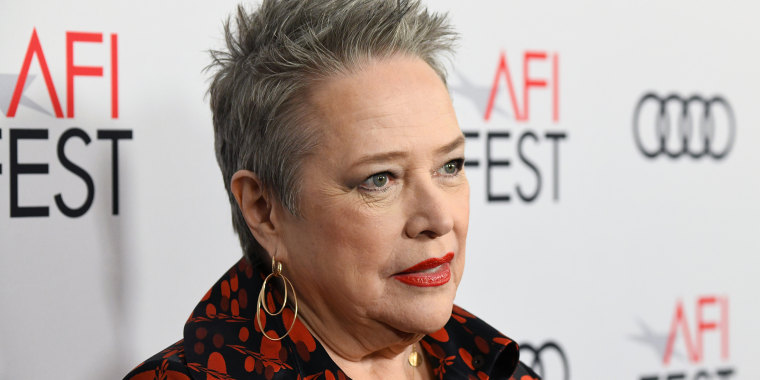Kathy Bates sat down with Kelly Clarkson earlier this week to discuss her upcoming film “Richard Jewell,” her duality in Hollywood when it comes to her comedic and dramatic roles, and a health issue that is near and dear to the actress’ heart.
On Tuesday’s episode of “The Kelly Clarkson Show,” Clarkson pointed out that like her character in “Richard Jewell,” Bates has gone through hardships in her life as well, including two cancer diagnoses.
Bates confirmed that she had ovarian cancer in 2003 and then breast cancer in 2012, followed by a double mastectomy. In the same breath, the 71-year-old actress and director gave advice to women to stay on top of their health.
“By the way, the BRCA (BReast CAncer) gene — I’m sure a lot of you ladies have heard of it — I tested negative and so, ain’t a get out of jail free card,” she told the audience and viewers watching at home. “I just wanna put that out there.”
There are two different BRCA genes — BRCA1 and BRCA2 — that can impact somebody's chances of developing breast cancer, according to the National Breast Cancer Foundation. These genes do not cause breast cancer but will play a role in preventing it as tumor suppressor genes. It is when the BRCA genes become mutated that they become ineffective and can lead to diagnosis at a young age.
The “Richard Jewell” actress continued to open up about her health, shining a light on a lesser-known conditions that affect a massive portion of people in the United States: lymphedema, a swelling of the limbs.
“Then I got something called lymphedema,” she told the host. “I don’t know if you’ve heard of it, but for cancer, they remove lymph nodes. I don’t care anywhere in your body. If your lymph system is damaged, at often times the fluid will back up in the affected limb.”
Bates' lymphedema diagnosis came after her double mastectomy and breast cancer treatment.
In a recent interview with SurvivorNet, Bates explained her reaction when she discovered lymph nodes had been removed during her surgery.
“I went berserk," she said. "I left the examining room and and ran out of the building. I still had my drains in, I was holding a pillow to my t*ts, and I thought, ‘What am I doing? It’s July, I’m standing out here, it’s hot, I’m still healing, I don’t want to hurt anything.'”
“I was bitter, I was depressed,” she adds. “I thought my career was over, I thought, ‘There’s no way, I’m done, everything is done.'”
Due to this condition affecting her life and health, Bates has became the national spokesman for the Lymphatic Education and Research Network. “It’s estimated that 10 million people in this country suffer with it,” she said to Clarkson. “That’s more than ALS, muscular dystrophy, MS, Parkinson’s and AIDS combined.”
While the diagnosis is hard enough to deal with as is, Bates revealed to Clarkson that it can go unnoticed by doctors. “Nobody knows about it and especially if we’re big girls and we go to a doctor and say, ‘I don’t feel right, my legs are swelling’ they say, ‘Oh, just go have a salad,’” she explained.
“It’s progressive and it’s incurable and it keeps going,” she added. “You can get infections that put you in the hospital and it’s congenital, there’s about 50,000 of those people who are kids who’ve grown up with it.”
But Clarkson caps Bates' informative interview with a conclusion we can all agree with.
She said, "It's bad thing that you have (lymphedema), it's a bad thing that you are suffering from it, but it's a good thing that you're in such a spotlight that you can shed a light on it."
